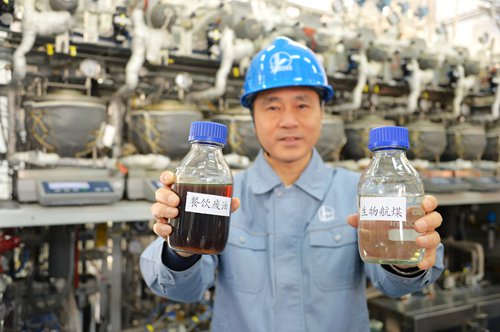
An employee of Sinopec Group holds the biofuel and cooking oil (right hand) to make a comparison. Photo: Courtesy of Sinopec Group
Biojet fuel is a type of sustainable aviation fuel made from renewable resources such as catering-sector waste oil, animal and vegetable oil, and agricultural and forestry waste.
It has been shown to reduce carbon dioxide emissions by more than 50 percent compared with traditional petroleum based aviation kerosene throughout its lifecycle, according to China Central Television.
In 2009, Sinopec developed biofuel production technology with independent intellectual property rights, and built a set of test equipment by using Sinopec's own production facilities.
The development of the fuel aided the completion of the first test flight in 2013, the first commercial flight in 2015 and the first transoceanic flight with biofuel in 2017.
The progress has made China the fourth country in the world with independent research and development and production technology of aviation biofuel after the US, France and Finland, according to media reports.
Wang Yanan, chief editor of Beijing-based Aerospace Knowledge magazine, told the Global Times on Monday that green fuel is a particularly important development in the aviation industry, because “in addition to pursuing higher technical efficiency in aviation itself, reducing carbon emissions has become an important goal, helping industry players to win the edge in global competition.”
“If the aviation industry is not green enough, the sector’s global commercial competitiveness will be affected,” Wang said.
However, the biggest problem with biofuel is that its cost is higher than petroleum based fuel, and the production process is relatively complicated, experts said.
Europe, the US and China are currently the major bases for research and development of biofuel technology, but so far, no biofuel produced in any region can completely match the current fossil fuels in terms of production cost, the Global Times learned.
China's self-developed biofuel has achieved a leap from serving domestic commercial flights to serving international airlines.
In May, China's first biofuel industrial plant with 100,000-ton production capacity per year undertook the first batch of large-scale trial production in Zhenhai, Zhejiang. The plant also obtained Asia's first global RSB biomass sustainable aviation fuel certification.
The fuel produced by Sinopec has been put into use on domestic routes by carriers such as China Eastern Airlines, China Southern Airlines and Air China.
“China owns the technology and we want to initially test it on a certain scale before promoting its wider use,” Wang said. “If we wait until it has matured before utilizing it, we will already be at a disadvantage when compared with others that are using it,” he added.
Global Times
